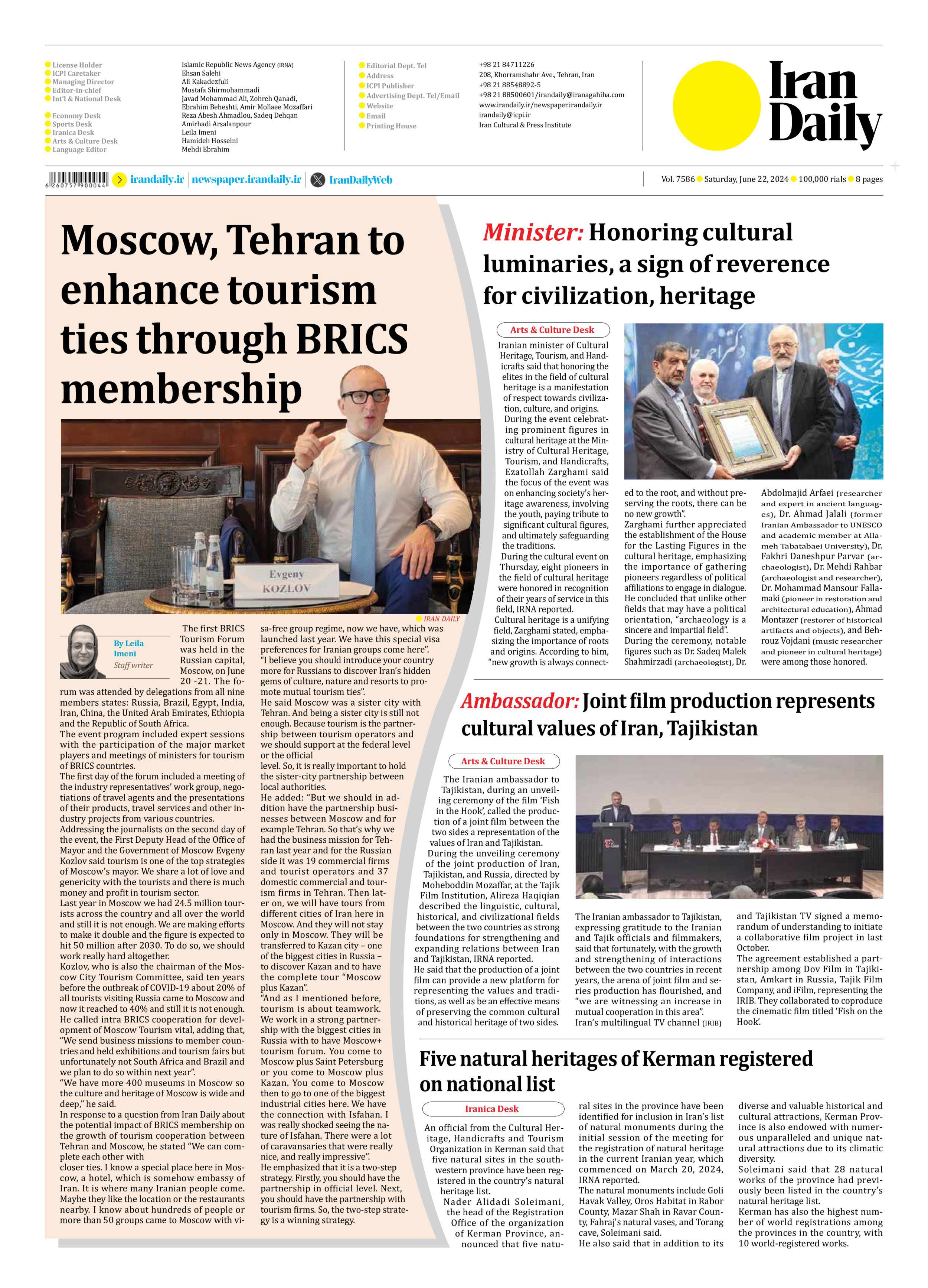
Moscow, Tehran to enhance tourism ties through BRICS membership
By Leila
Imeni
Staff writer
The first BRICS Tourism Forum was held in the Russian capital, Moscow, on June 20 -21. The forum was attended by delegations from all nine members states: Russia, Brazil, Egypt, India, Iran, China, the United Arab Emirates, Ethiopia and the Republic of South Africa.
The event program included expert sessions with the participation of the major market players and meetings of ministers for tourism of BRICS countries.
The first day of the forum included a meeting of the industry representatives’ work group, negotiations of travel agents and the presentations of their products, travel services and other industry projects from various countries.
Addressing the journalists on the second day of the event, the First Deputy Head of the Office of Mayor and the Government of Moscow Evgeny Kozlov said tourism is one of the top strategies of Moscow’s mayor. We share a lot of love and genericity with the tourists and there is much money and profit in tourism sector.
Last year in Moscow we had 24.5 million tourists across the country and all over the world and still it is not enough. We are making efforts to make it double and the figure is expected to hit 50 million after 2030. To do so, we should work really hard altogether.
Kozlov, who is also the chairman of the Moscow City Tourism Committee, said ten years before the outbreak of COVID-19 about 20% of all tourists visiting Russia came to Moscow and now it reached to 40% and still it is not enough.
He called intra BRICS cooperation for development of Moscow Tourism vital, adding that, “We send business missions to member countries and held exhibitions and tourism fairs but unfortunately not South Africa and Brazil and we plan to do so within next year”.
“We have more 400 museums in Moscow so the culture and heritage of Moscow is wide and deep,” he said.
In response to a question from Iran Daily about the potential impact of BRICS membership on the growth of tourism cooperation between Tehran and Moscow, he stated “We can complete each other with
closer ties. I know a special place here in Moscow, a hotel, which is somehow embassy of Iran. It is where many Iranian people come. Maybe they like the location or the restaurants nearby. I know about hundreds of people or more than 50 groups came to Moscow with visa-free group regime, now we have, which was launched last year. We have this special visa preferences for Iranian groups come here”.
“I believe you should introduce your country more for Russians to discover Iran’s hidden gems of culture, nature and resorts to promote mutual tourism ties”.
He said Moscow was a sister city with Tehran. And being a sister city is still not enough. Because tourism is the partnership between tourism operators and we should support at the federal level or the official
level. So, it is really important to hold the sister-city partnership between local authorities.
He added: “But we should in addition have the partnership businesses between Moscow and for example Tehran. So that’s why we had the business mission for Tehran last year and for the Russian side it was 19 commercial firms and tourist operators and 37 domestic commercial and tourism firms in Tehran. Then later on, we will have tours from different cities of Iran here in Moscow. And they will not stay only in Moscow. They will be transferred to Kazan city – one of the biggest cities in Russia – to discover Kazan and to have the complete tour “Moscow plus Kazan”.
“And as I mentioned before, tourism is about teamwork. We work in a strong partnership with the biggest cities in Russia with to have Moscow+ tourism forum. You come to Moscow plus Saint Petersburg or you come to Moscow plus Kazan. You come to Moscow then to go to one of the biggest industrial cities here. We have the connection with Isfahan. I was really shocked seeing the nature of Isfahan. There were a lot of caravansaries that were really nice, and really impressive”.
He emphasized that it is a two-step strategy. Firstly, you should have the partnership in official level. Next, you should have the partnership with tourism firms. So, the two-step strategy is a winning strategy.







